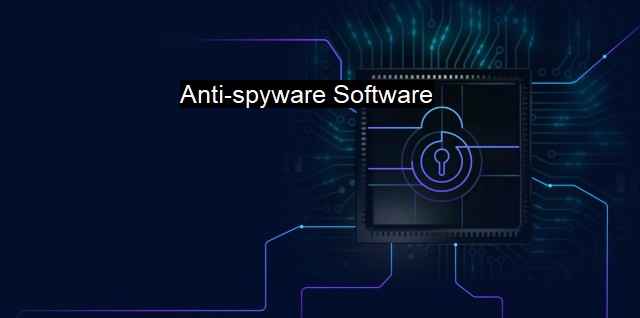What is Anti-spyware Software?
The Importance of Anti-Spyware Software in Modern Cybersecurity: Safeguarding Confidentiality, Privacy, and Information Security
Anti-spyware software is a type of program specifically designed to prevent and eliminate spyware, a form of malware that gathers user's private information through their internet connection without their knowledge. Spyware can infiltrate a computer system in various ways - through vulnerable software, freeware programs, infected emails, or malicious websites. Once a computer is infected, spyware can monitor and record user's activity, collect personal data, change computer settings, and interfere with network connections. In a broad cybersecurity context, anti-spyware is a critical part of a comprehensive internet safety approach which includes firewalls, antivirus software, and password protections.Anti-spyware software operates in similar fashion as antivirus software, but focuses specifically on detecting and removing spyware threats. Unlike viruses that seek to corrupt or damage your system files, spyware exploits are designed to surveil, steal information, or generate profit for the attacker via adware. A good anti-spyware software can recognize thousands of spyware applications and block those trying to infiltrate a computer system.
Anti-spyware protection programs can perform regular sweeps of a computer system either through scheduledled scans or in real time. Regular scanning ensures that the system is continually monitored to detect potential threats while real-time protection prevents malicious activity as soon as it is detected. As new spyware programs are developed often, anti-spyware software must be updated frequently to add the definitions of new forms of spyware and recognize latest threats.
Many standalone anti-spyware programs are available in the market, both in free or charged versions. Certain comprehensive cybersecurity systems also contain anti-spyware capabilities. The selection of suitable anti-spyware software depends on various factors such as the user's surfing habits, effectiveness of the program, user interface, ease of use and compatibility with the system among others.
In small-scale systems or personal computers, anti-spyware plays an important role in safeguarding sensitive information and ensuring optimal computer performance. in larger-scale organizations where many computers are networked together, the deployment of anti-spyware software becomes even more critical. In such cases, a programmed central console can often manage anti-spyware services since it meticulously scans every incoming and outgoing network traffic. This ensures protection against spyware threats that could potentially result in widespread damage.
Hence, in conjunction with firewalls and antivirus software, an effective anti-spyware application creates a layered defence against the mounting threats of malware and unauthorized system accesses. Spyware is more of an intrusive and damaging threat to users as it steals important information and breaches personal data. Therefore, anti-spyware software is not just a complimentary add-on; it represents a fundamental component of modern cybersecurity measures.
The use of anti-spyware encompasses a larger need; the right to privacy and safeguarding of personal data. It's a tool meant not just for recent times but for the future, since the advent of technology will inevitably bring forth stronger, more pervasive spyware. This underlines the urgent need for regular advancement and development in the field of anti-spyware software technology.
Anti-spyware software is an essential element in a broader cybersecurity framework aimed at maintaining privacy and securing personal information in a digital connected world. Its primary functionality involves scanning, detecting, and eliminating malignant applications that attempt to surreptitiously monitor and harvest user activities. As the number and sophistication of spyware attacks continue to increase, the roles that anti-spyware software performs will remain a crucial part of any solid cybersecurity approach.

Anti-spyware Software FAQs
What is anti-spyware software?
Anti-spyware software is a type of cybersecurity program designed to identify and remove spyware from your computer system. Spyware is a malicious program that can track your online activities, steal your sensitive information, and compromise your system’s security. Anti-spyware software helps protect your computer and personal data by identifying and removing spyware programs.How does anti-spyware software work?
Anti-spyware software generally works by scanning your computer for any spyware programs that may be present. The software will then analyze the results of the scan and remove any threats it identifies. Some anti-spyware programs also offer real-time protection, which constantly monitors your system to prevent new spyware from being installed.Is anti-spyware software the same as antivirus software?
While both anti-spyware and antivirus software aim to protect your computer from security threats, they are not the same thing. Antivirus software focuses on identifying and removing viruses, while anti-spyware software is specifically designed to detect and remove spyware. It’s recommended to use both types of software for comprehensive protection.Do I need to use anti-spyware software if I already have antivirus software?
Yes, it’s still important to use dedicated anti-spyware software even if you have antivirus software installed on your computer. Antivirus software is not specifically designed to detect and remove spyware, and spyware can often remain undetected by antivirus programs. Therefore, using both types of security software provides better protection against all types of malware.| | A | | | B | | | C | | | D | | | E | | | F | | | G | | | H | | | I | | | J | | | K | | | L | | | M | |
| | N | | | O | | | P | | | Q | | | R | | | S | | | T | | | U | | | V | | | W | | | X | | | Y | | | Z | |
| | 1 | | | 2 | | | 3 | | | 4 | | | 7 | | | 8 | | |||||||